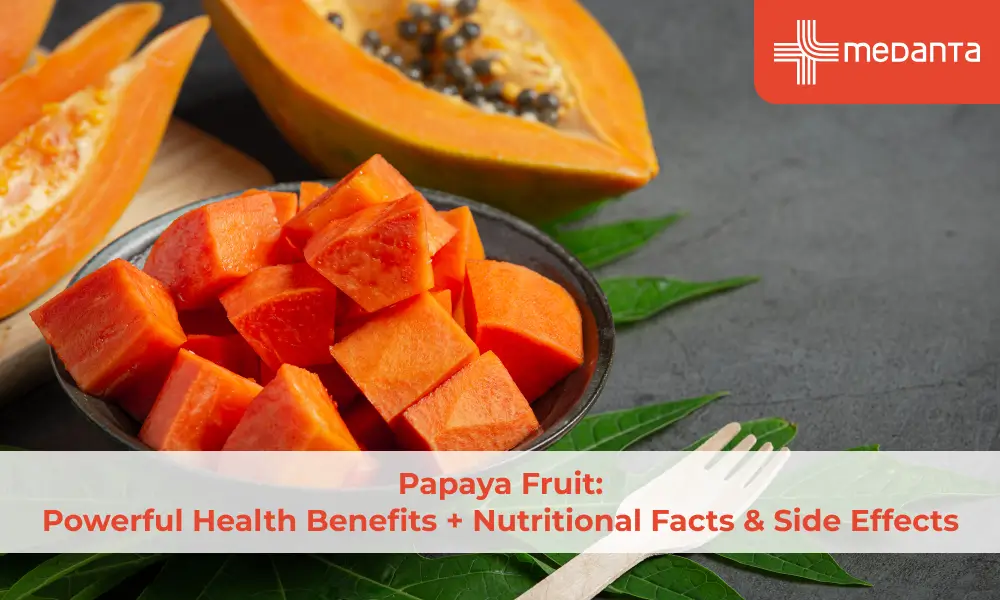Papaya Fruit: Powerful Health Benefits + Nutritional Facts & Side Effects

TABLE OF CONTENTS
Most of us love papaya for its taste. It is an easily available fruit which we often take as a salad. But only some of us are aware of the fact that papaya offers many benefits beyond its deliciously sweet tropical flavour. Mexico's native papaya has gained worldwide popularity, and India now leads global production. The fruit's impressive nutritional profile delivers substantial health benefits. The fruit stands out with its rich content of carbohydrates, proteins, lipids, and dietary fibre. People should know about papaya's side effects, especially from unripe fruit that contains papain—a chemical that breaks down proteins, carbohydrates, and fats. Knowledge about papaya's benefits and side effects helps people decide if this nutritious fruit fits their diet.
Nutritional Value of Papaya
Papayas offer amazing nutrition while being low in calories. You get just 43 calories from a 100g serving. This makes it perfect if you want to eat healthy. The fruit has 88% water content that helps you stay hydrated.
The nutritional breakdown per 100g of papaya:
It contains carbohydrates (11g)
It has proteins around 0.5g
100 grams of papaya has fat around 0.3g
Fibre: 1.7g
Papaya's health benefits come from its rich vitamin content. A single serving gives you 60.9mg of vitamin C (101% of daily needs) and 950 IU of vitamin A (19% DV). On top of that, it provides folate (37mcg), potassium (182mg), and several B vitamins.
The fruit contains powerful antioxidants like beta-carotene, lycopene, and flavonoids. These substances work to fight free radicals and reduce oxidative stress in the body. Papayas allow the body to absorb these helpful antioxidants more than carrots or tomatoes. Papaya stands out among fruits like apples, bananas and oranges. This ability makes papayas useful for maintaining overall health.
Health Benefits of Papaya
Nutrients
Papaya contains plenty of vitamins A, C, and E.
Antioxidant effects
The fruit is packed with powerful antioxidants like lycopene, quercetin, and kaempferol that reduce oxidative stress. Research shows that fermented papaya can decrease oxidative stress in older adults and people with prediabetes. These antioxidants fight harmful free radicals in your body effectively.
Anticancer properties
Scientists have found that papaya's lycopene may have anticancer properties. The fruit's extract has shown remarkable effects against various tumours, including cancers of the cervix, breast, liver, lung, and pancreas. The extract did not harm normal cells.
Improves digestion
Papain enzyme helps you digest protein better. People in tropical regions use papaya to treat constipation and irritable bowel syndrome symptoms. The fruit's high fibre and water content help maintain regular digestion.
Prevents skin damage
Antioxidants in papaya protect against visible ageing signs. Research showed women using a lycopene blend experienced less noticeable wrinkle depth. Vitamin C in papaya helps the body make collagen and makes skin more elastic.
Versatile
Papaya's special flavour works well in desserts and main courses, adding a tasty twist to meals.
Common Uses of Papaya (Culinary and Medicinal)
Papaya ranks among the most versatile fruits you can find in kitchens and medicine cabinets worldwide. People rely on this unique fruit in both its ripe and green forms to create meals and treat ailments in various cultures.
Culinary enthusiasts can transform ordinary meals into delightful dishes with papaya:
Fresh with lime juice and salt as a simple snack
Filled with ice cream, sorbet or other tropical fruits as dessert bowls
Added to smoothies for fibre and natural sweetness
Roasted or grilled with brown sugar for a caramelised treat
Prepared as green papaya salad with spices and fish sauce
Papaya's medicinal value extends far beyond the kitchen:
The enzyme papain tenderises meat and aids digestion.
For generations, traditional healers have turned to different parts of the plant to soothe illnesses and support healing. Papaya leaves help treat dengue, malaria, and asthma. Its seeds act as natural deworming agents.
Historical records show the plant's effectiveness in treating ulcers, arthritis, and digestive disorders.
The fruit's leaves and seeds are used to ease stomach pain and fight infections.
The latex (milky juice) helps treat skin conditions like eczema and psoriasis.
Potential Side Effects and Precautions
By now, you must have known various health benefits of papaya. But you should also know about some risks that are linked to this tropical fruit. These include:
Raw papaya contains latex with papain enzyme that could harm your oesophagus if you eat too much. In addition, pregnant women need to stay away from unripe papaya since the latex might cause uterine contractions and early labour.
You face a higher chance of papaya allergies if you have latex allergies because they cross-react. Watch out for these papaya latex allergy signs:
Rashes and itching
Nasal congestion and wheezing
Chest tightness
In severe cases, anaphylactic shock
Papaya helps digestion, but eating too much can lead to stomach problems, bloating or diarrhoea. People with diabetes should be careful because papaya can drop blood sugar levels, especially when you have blood sugar-lowering medication.
Your blood-thinning medications like warfarin might not work well with papaya.
Papaya leaves could upset your stomach.
Ripe papaya remains safe to eat in moderate amounts. You should check with your doctor before making it a regular part of your diet if you have specific health conditions.
How to Incorporate Papaya Into Your Diet
Papaya is a great way to mix up your usual meals and does not require any special cooking abilities. This colourful fruit fits into lots of recipes making it simple to enjoy what it offers.
Start your day with papaya halves filled with Greek yoghurt and top them with blueberries and chopped nuts. You can also spread mashed fresh papaya on toast instead of jam. A splash of lime juice on papaya slices will boost their flavour and minimise any unwanted smells.
Quick serving suggestions:
Mix with milk, sugar and vanilla to make a refreshing shake
Create papaya sorbet by mixing it with water, sugar and lemon juice
Pour sweetened condensed milk over fresh papaya
Grill papaya wedges until they caramelise
Savoury dishes work great with papaya too. Make fruit salsa by mixing it with tomatoes, onions and cilantro. Papaya's leaves and peels can tenderise meat naturally.
Your digestion will thank you when you eat a small bowl of ripe papaya after dinner. A honey and lemon smoothie with papaya will help strengthen your immunity.
Conclusion
Papaya shines as a nutritional powerhouse with benefits way beyond the reach and influence of its sweet taste. This fruit contains a lot of vitamins A and C. It strengthens your immune system and helps your skin look healthy and shine naturally.
Papaya's health advantages come from its rich blend of nutrients and compounds. Powerful antioxidants in papaya fight harmful free radicals and reduce oxidative stress in the body. The papain enzyme breaks down proteins and helps to digest food more easily. On top of that, it shows promise in fighting cancer, especially through compounds like lycopene.
You can enjoy papaya in many simple ways. The fruit tastes great fresh with a squeeze of lime, blended into smoothies, or mixed into fruit salads. Both sweet and savoury dishes work well with papaya, making it a versatile ingredient for everyday cooking.
Papaya definitely lives up to its superfood status. This tropical gem provides many health benefits and causes little harm if eaten in moderation as part of a well-rounded diet.
FAQs
What nutrients are found in papaya?
Many people want to know what makes papaya so nutritious. A small papaya (152 grams) packs these nutrients:
Just 68 calories
17 grams of carbohydrates
3 grams of fibre
98 mg of vitamin C (107% of daily needs)
74 mcg of vitamin A
286 mg of potassium
How does papaya support digestion and immunity?
Papaya helps your digestion through:
Papain is an enzyme that breaks down proteins
High fibre content that keeps your digestion healthy
Knowing how to help with gluten digestion in people with sensitivity
Your immune system benefits from papaya because it:
Provides over 200% of daily vitamin C requirements
Contains vitamin A, which is vital for immune function
Are there any risks or side effects of eating papaya?
Watch out for:
Unripe papaya's latex content that might damage the oesophagus
Allergic reactions, especially if you're sensitive to latex
Interactions with medications like warfarin and diabetes drugs
Effects that could lower blood sugar
How can papaya be used for skin and hair care?
Papaya benefits your skin by:
Providing vitamin C that boosts collagen production
Fighting wrinkles with its antioxidants
Using papain enzyme to exfoliate naturally
Papaya helps your hair by:
Getting more growth and thus encouraging more volume
Fighting dandruff with its antifungal properties






